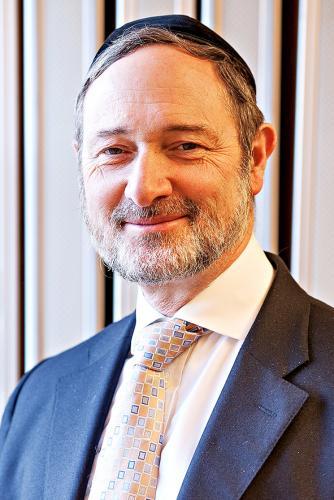A message to my dear friends at St John’s Wood
From Rabbi Yisroel Fine
There cannot have been many times in our history when we have voluntarily closed the doors of our shuls.
We have suffered the destruction of our shuls through pogroms and persecution, but in living memory we probably have to go back to the abandonment of our shuls in Gaza for us to have relived such a painful experience.
Of course, the comparison does not entirely fit. The one was because of the enemy without and the other because of the enemy within. The shuls in Gaza were torched within hours of their abandonment, but ours remain empty but waiting for the return of the two voices of Torah and tefillah which gave them life.
As some of us entered the building before it closed the shul was devoid of life. Not even a ‘small still voice’. Through the silence one heard the soft whisper of ‘Why have you forsaken Me’ – the plaintiff cry of the Almighty, but then the words that I surely knew would follow –‘ Imcho Onochi Betzoro’- ‘I am with you in your distress’.
So when we collected our talleisim and siddurim and removed the chometz from our boxes we confirmed that we shall surely return and reclaim that communion with the Divine which only communal prayer can offer us.
However, although the doors of the Shul may have closed, the doors of the Kehilla remain wide open.
The Jerusalem Talmud relates that as Rabbi Chama Bar Chanina and Rabbi Oshaya Rabba were walking past the Shuls of Lod, Rabbi Chama exclaimed to Rabbi Oshaya, ‘How much money did our fathers invest here’, prompting the response, ‘How many souls did your fathers invest here’ – ‘Kamo nefoshos shoku avosecho kan’.
Our shul building may be a modest one, but the richness of our Kehilla is to be found in the warmth and devotion of those souls that invoke the Divine presence through tefilla, morning, afternoon and evening. It is to be found in the in the way that diverse souls, rich and poor, young and old, feel for each other, care for each other and share each other’s joys and tears.
The doors of the Shul may have closed but the doors of the Kehilla remain wide open.
This Shabbos is Shabbos Hachodesh when we will layn the parsha describing that most complex of all sacrifices – the Korban Pesach. Both complex and perplexing; a list is required of the participants, to be consumed by the morning, not to be taken beyond the home, but if numbers are small families can share. The list goes on. Was this the inspirational initiation rite that the newly emerging Jewish nation on the threshold of freedom were anticipating? Was it for this that they had to endure 210 years of unremitting suffering?
Not so perplexing explains Rabbi Samson Rafael Hirsch. On the contrary It took the genius of the Almighty to devise an experience which would begin the process of rehabilitation for a people who had been robbed of their identity on three levels; as individuals, as families and as a nation.
‘ B’michsas nefoshos’ ‘according to the number of souls’ – each person counted, all equal in the mitzvah, men and women, young and old. Self-esteem and a sense of individuality was restored.
‘Lo Sotzi min habosor chutzah’ – ‘you shall not take the meat outside’ – You eat as a family unit as the forerunner of the majesty of Jewish home life.
‘Kol adas b’nei Yisroel ya’asu oso’- ‘All the House of Israel shall do so’ – Beyond the walls of your home the great Jewish Nation is sharing the same experience as the Great Shepherd in heaven watches over his flock.
As challenging as these days may be for us as a Kehilla, an opportunity presents itself; – to redouble our efforts in our Judaism to grow as individuals, as families and as Klal Yisroel.
As individuals we may have more time for contemplation and review of our daily routine and priorities.
As families spending more time confined at home with the increased bustle and noise that this presents, these days and weeks can be challenging, but they also provide more opportunities to spend meaningful time in Torah study, conversation and activities with children and of course one’s spouse.
And lastly and perhaps most importantly, trivialities which so often fracture us as a nation recede into the background in such times. Our fears and apprehensions likewise fade when they are replaced with tefillah and care for each other.
The Korban Pesach may no longer be with us, but the Shepherd of Israel continues to watch over us.


